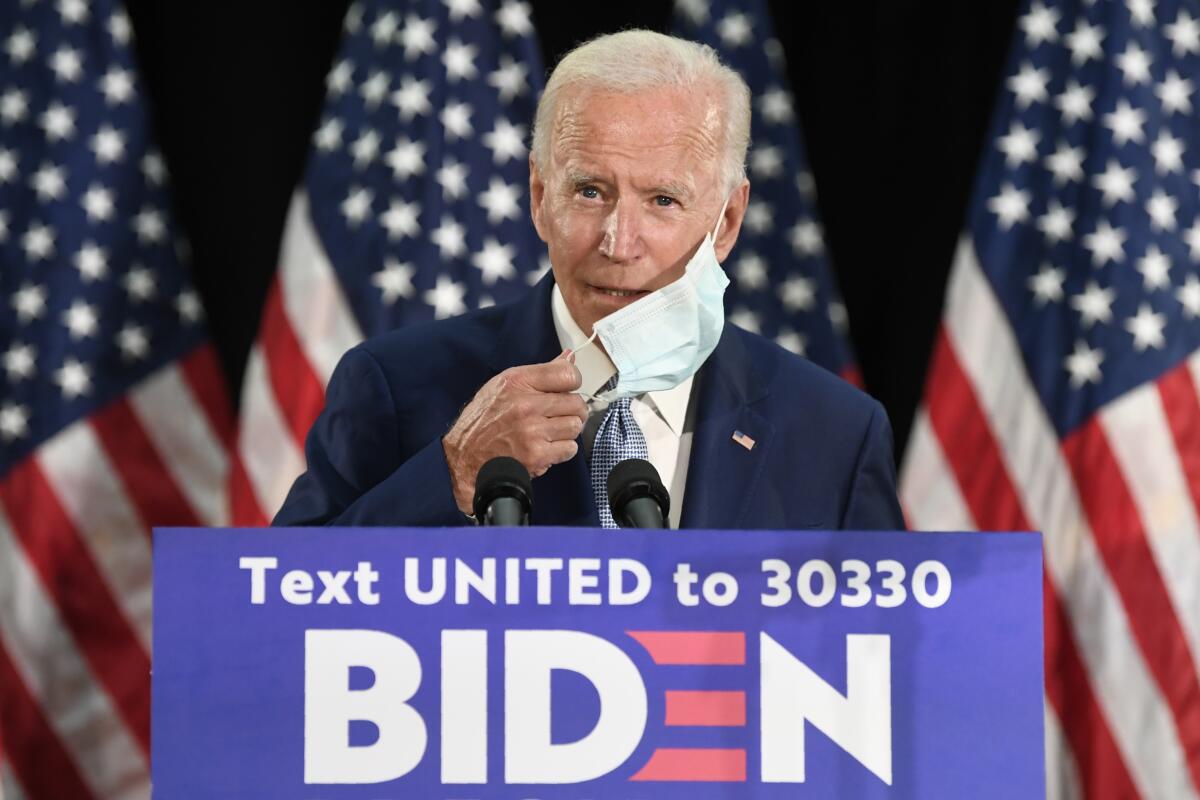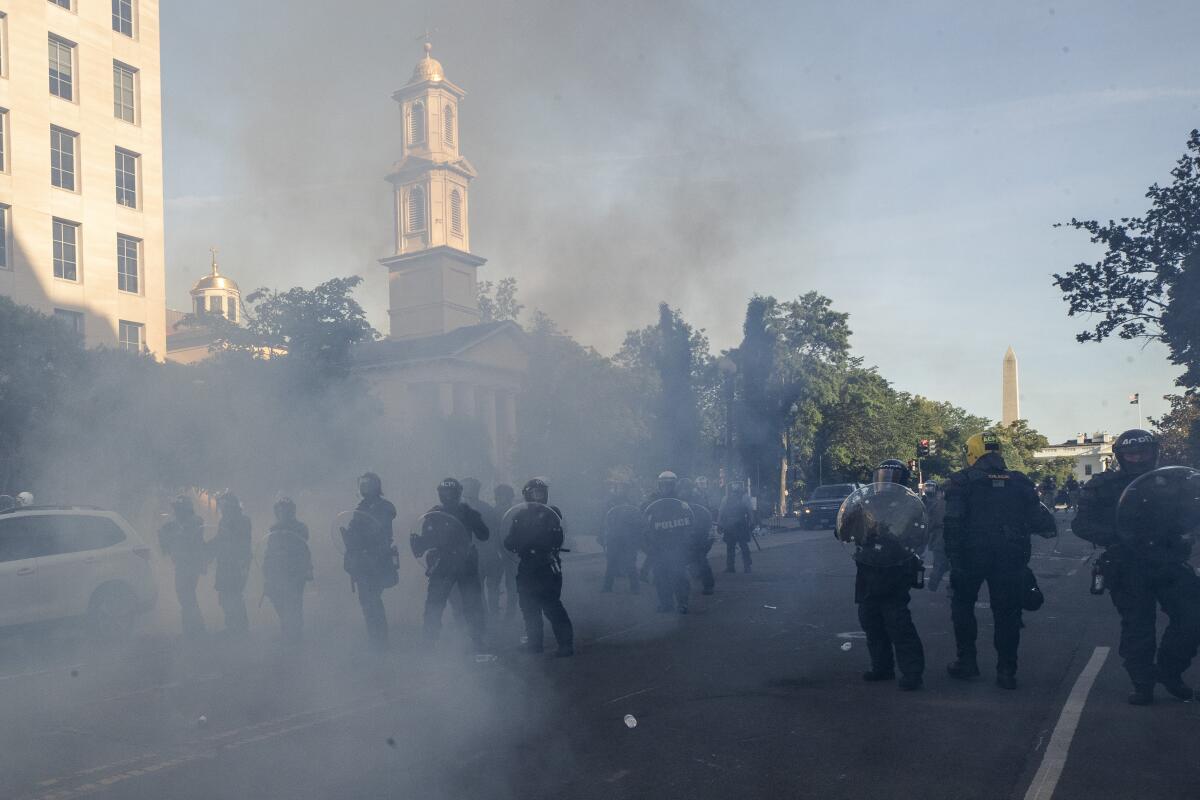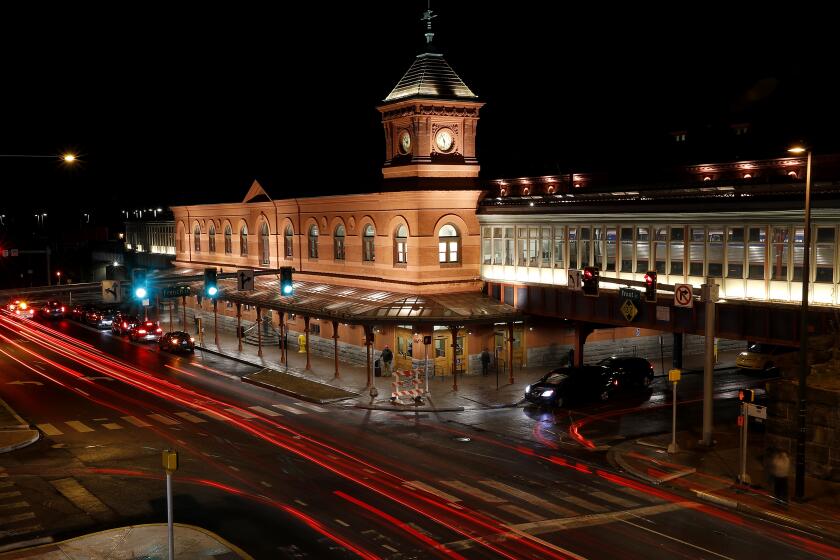Biden vows police reform after sealing Democratic nomination to challenge Trump

- Share via
When Joe Biden announced he was running for president, he framed his campaign as “a battle for the soul of this nation,” saying President Trump threatened its core values by condoning the racism of torch-carrying neo-Nazis who marched in 2017 through Charlottesville, Va.
The former vice president, who has captured the 1,991 delegates he needed to formally win the Democratic nomination, returned to the theme of racial discord Saturday as thousands protested the killing of George Floyd, an African American man who died last month after a white Minneapolis police officer kneeled on his neck for almost nine minutes.
“It’s long past time for our nation to deal with systemic racism, including its contributions to growing economic inequality,” Biden wrote in a Los Angeles Times op-ed. “We must seize this moment of opportunity to address all the issues that have denied the promise of this nation to so many for so long. Let’s use this moment of urgency to finally find the path forward.”
Biden’s victory Friday in the Democratic race, a foregone conclusion since Vermont Sen. Bernie Sanders dropped out in April, sets up a five-month clash with a Republican president who routinely shatters the normal bounds of political combat. With low poll ratings threatening his reelection, Trump, 73, has been sullying the image of Biden, 77, in a barrage of television ads depicting him as borderline senile and beholden to China.
Biden’s emergence as the Democratic nominee came after a year of often lackluster campaigning against rivals in the most diverse field of presidential candidates in his party’s history. The nearly two dozen contenders included six women, three African Americans, two Asian Americans, a Pacific Islander, a Latino and a gay man.
Biden, who had trouble raising money, had a dismal start in the early contests, placing fourth in Iowa and fifth in New Hampshire. But he finished second to Sanders in Nevada before his dramatic comeback in South Carolina, where black voters swept him to victory thanks partly to his service under President Obama.
Three days later, Biden carried 10 of the 14 states that held primaries on Super Tuesday. He went on to beat Sanders in nine more states before the Vermont senator quit the race. Biden effectively clinched the nomination by winning eight more primaries on Tuesday.
The stakes in the general election have risen since Biden launched his campaign in April 2019 with a video portraying Trump as a profound threat to America. The ongoing nationwide protests over racism and police brutality come amid a coronavirus pandemic that has killed nearly 110,000 people in the United States and left the economy in its worst condition since the Great Depression.
Joe Biden’s hometown of Wilmington is known for its small size and relationship-based politics. But just as in national politics, backlash has been brewing against the status quo.
Trump has made clear he will continue stoking the nation’s racial and cultural divisions. As NFL Commissioner Roger Goodell released a video Friday encouraging peaceful protests and saying the league was wrong for not listening to players earlier about inequality and police misconduct, Trump resumed his condemnation of players who kneel during the national anthem to protest police brutality and racial injustice.
“We should be standing up straight and tall, ideally with a salute, or a hand on heart,” Trump wrote on Twitter. “There are other things you can protest, but not our Great American Flag — NO KNEELING!”

Biden now faces pressure to embolden his agenda to address racial inequities not just in the criminal justice system, but also in education, housing, healthcare and economic opportunity.
Charlamagne tha God, an author and radio host who recently interviewed Biden, urged him to push a civil rights agenda “that smashes white supremacy” on a scale of the laws passed in the 1960s under President Lyndon B. Johnson.
“We need Joe Biden to be that kind of civil rights hero,” he said Thursday on CBS’ “The Late Show With Stephen Colbert.” “Right now, this moment calls for it. We need that kind of radical legislative change.”
In his op-ed, Biden mentioned the Civil Rights Act of 1964 and Voting Rights Act of 1965, saying they were enacted after Alabama police commissioner Eugene “Bull” Connor unleashed vicious dogs on black protesters. “History teaches us that our darkest moments have produced some of our greatest progress,” Biden said.
He pledged a national police oversight commission, a ban on chokeholds, a halt to transferring “weapons of war” to local police, and federal support for “real community policing.”
After winning the party nomination on Friday, Biden said he was “building a movement that will transform our nation.”
“So many feel knocked down by the public health and economic crisis we are weathering,” he said. “So many feel counted out and left behind by a society that has for too long viewed them as less than equal, their lives as less than precious.”
Vice President Mike Pence told Fox News on Saturday that Biden was engaging in “the predictable, divisive politics of the American left.”
“The truth is that we see in Joe Biden a willingness to align himself with people that are rioting on the streets, destroying the property and livelihoods, claiming the lives of innocent civilians and law enforcement officers, and yet, not speaking a word on behalf of those that have been victims,” Pence said.
Historian Rick Perlstein described Biden, a U.S. senator for 36 years, as a “bellwether politician” who — like Johnson before he ascended to the presidency after John F. Kennedy’s assassination — is not easily seen as a leader of major structural change in American society.
But the “interlocking catastrophes” of COVID-19, a historic surge in unemployment and now racial upheaval could well force Biden, should he unseat Trump, to rise to the occasion and pass laws as sweeping as the New Deal adopted under President Franklin D. Roosevelt to overcome the Depression, he said.
“The kind of sink-or-swim ideology of America is not going to cut it,” said Perlstein, author of “Nixonland,” a book on the social turbulence of the 1960s and ‘70s in the United States. “So it is in a lot of ways a New Deal moment, and it really demands a president who’s willing and able to build a coalition for structural change, or else we’re going to face all kinds of catastrophes like the ones we’re going through now.”
More to Read
Get the L.A. Times Politics newsletter
Deeply reported insights into legislation, politics and policy from Sacramento, Washington and beyond. In your inbox twice per week.
You may occasionally receive promotional content from the Los Angeles Times.












